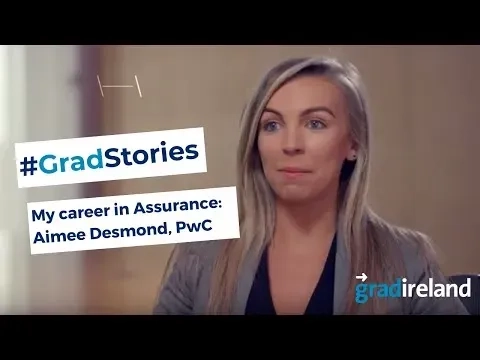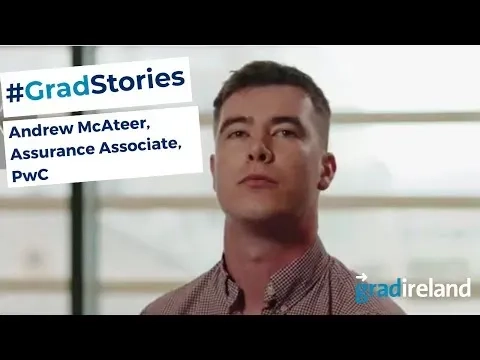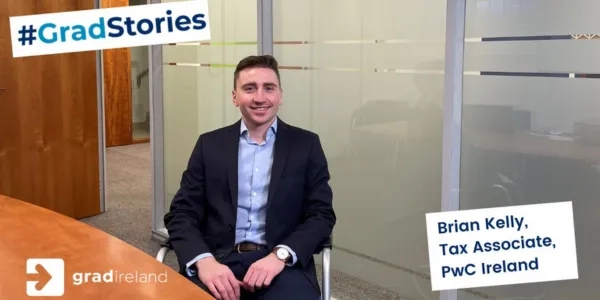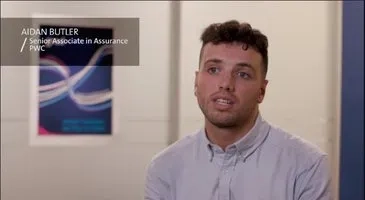My PwC experience: Nifemi Ogunbiyi, Assurance Associate
20 Sept 2023, 12:40
Nifemi Ogunbiyi is an Assurance Associate with PwC Ireland. She graduated from UCD with a BSc in Biochemistry & Molecule Biology. She shares her insights on what makes PwC special and how she made an internship count to build a successful start to her career.

Tell us about your current role and educational background?
My name is Nifemi Ogunbiyi and I’m an Assurance Association with PwC Ireland. I graduated from UCD with a BSc in Biochemistry & Molecule Biology.
Since you joined us, what has surprised you about PwC?
Since, I’ve joined what has surprised me about PwC is how lovely and amazing everybody is here. I had an idea that the employees were welcoming, however for the most part, everyone goes out of their way to integrate you into the company.
PwC also goes the extra mile to take care of its employees. From partially funded study leave to extra exam classes, exam success bonuses, Christmas presents, breakfast and dinner, flexible working and much more.
What have you enjoyed most, and what are the challenges?
What I have enjoyed the most is the smooth introduction into the world of business. I have a background in science so my job in PwC being my first exposure to the professional business world. What seems like a strange change in career, has been an interesting and challenging journey. I’ve grown from being a shy and timid newly hired associate, to being a soon-to-be senior associate this year with an ACA Qualification.
But this journey does have its challenges. The nature of my job requires problem solving and whole leadership. This means that when issues or uncertainties arise, time and critical thinking is required to solve them. Whole leadership requires me to take responsibility for all my section of the audit, while seeking coaching from senior colleagues.
What was the most challenging part of the application process and what advice would you have to others on dealing with similar challenges?
Fortunately, the application process for PwC is not complicated. However, the process took time and effort as I was tailoring my application and CV to the role I was applying for at PwC. When I was at the stage of seeking an internship I applied to a number of places, and with that came the temptation to use the ‘one-for-all’ application answers and CV for all my applications. But I had to realise that the last thing employers, such as PwC, want to see is a generic application (I’m sure they get many of those).
If you’re dealing with a similar challenge,I would advise that you do your research into who PwC are and find out more about the roles and responsibilities of the area you are applying to. Once you know what will be expected of you in the role you are applying for, you can use that knowledge to tailor how you present your skills, work experience and education to your PwC application and CV. This will make you stand out and will show you’ve done a bit more work than other candidates have.
Preparing for the interview was also another area that I found challenging. The best advice I can give to someone who is nervous about the interview is to show the interviewer who you are as a person and why you would be a good fit in PwC. I would also advise that you have in mind at least one current business issue that you find interesting and have some idea on how you think that business issue will possibly PwC clients.
What are some of the soft or transferable skills that you use in your role and what other ones have you developed?
I use various soft and transferable skills in my role as an assurance associate in PwC, such as communication, problem-solving, teamwork, organisation, critical thinking, interpersonal and leadership skills. I graduated from UCD with a BSc in Biochemistry & Molecular Biology and pursued a qualification as a Chartered Accountant in PwC. I was happy to find that the skills I gained from my degree were useful for my current role. I acquired these skills through activities like thesis presentations, group assignments and experimental write-ups. My role in PwC also helped me develop technical, decision making and IT skills. I deal with different clients and business challenges in the assurance department. This allows me to apply my technical accounting skills and make decisions on how to audit various aspects of the business. PwC promotes digital and technological innovation, which motivated me to improve my IT skills.
What advice would you have for someone in the first week of their internship or graduate position in order to make a good impression?
The first week of your internship or graduate position usually starts off with department-specific training. My advice for someone who wants to make a good first impression is put yourself out there and step out of your comfort zone. In your training, ask and answer questions. Volunteer if your tutors or other staff members are looking for someone to participate in something. Be friendly and get to know people because you can actually make good friends in PwC.
I believe that nothing stands out more than self-confidence and a friendly face. If you are a bit shy and still very nervous, like I was a few times, fake it till you make it and say a little prayer. You’ll be more than fine once you put your mind to it.
What are some of the main things you have learned about yourself during the course of your experience to date with PwC.
I first encountered PwC in 2019 as a 20-year-old intern. I came back again in 2020 as an Associate and now I’m a Senior Associate, which is still hard to believe! I’ve learnt a whole lot about myself in the past four years during the course of my experience to date with PwC. One of the things I’ve learned is adaptability. Not only did I have to learn to adapt to the change in career path from science to accounting, but I also have had to adapt when dealing with several different types of clients. I’ve been on many audit teams for clients in industries such as pharmaceutical, construction, sports, hospitals, and charities. I didn’t realise I could handle so much change!
I’ve also learned that when I put my mind to something I can do it a lot better than I thought I would. Once training is over, you learn on the job when it comes to an internship or a graduate programme in PwC, and this can seem daunting when you’re faced with a task that you’ve never done before. Thankfully, there are many people to assist you. Looking back, I’ve experienced this situation many times and I’ve survived each time with positive feedback.
Finally, my journey in PwC has taught me that I can work well under pressure. There will be busy seasons due to tight deadlines and large volumes of work. However, the work gets done eventually and in hindsight you realise that with hard work and determination, you’re more capable to handle challenges than you think you are.
How would you describe PwC’s culture and working environment?
PwC’s culture is one that is centered about care for its employee and its clients. As I mentioned before, one of the things that surprised me the most is how much PwC takes care of its employees and aims to cater to its employee’s needs.
PwC’s working environment is vibrant and hard-working. The physical working environment in Spencer Dock is in itself a motivator with the colour and daylight that enters the office. The spirit of hard work that exists in PwC is almost contagious. Feedback tools such as Seoda and Snapshot encourage workers to do the best they can.
What is the best thing about working at PwC?
The best thing about working in PwC are the opportunities for personal and professional development. Every employee is assigned a coach, and through my coach my performance is regularly reviewed, and our discussions encourage me to think of areas I can improve in my work. I believe this is invaluable as it provides guidance in my career journey and in the development of my personal business acumen.
How do you create a work/life balance for yourself?
Since the introduction of working from home and hybrid working, creating a work/life balance has not been difficult. I live in Drogheda, Co. Louth. So, commuting into the office could take around 1.5 hours with traffic. The ability to work from home cuts out the travel hours which gives me more time for my work and personal activities.
On days I’m in the office, I make sure to make the most of it by catching up with a friend after work in Dublin, which allows me to avoid after-work rush hour while I socialise.
Outside of work what is your passion/hobby??
Outside of work I volunteer in my local church community. I participate in activities such as teaching the youths in the community and organising social events for them. I’m also part of a gospel choir, where we host monthly music gatherings. I also thoroughly enjoy singing and playing the keyboard.





